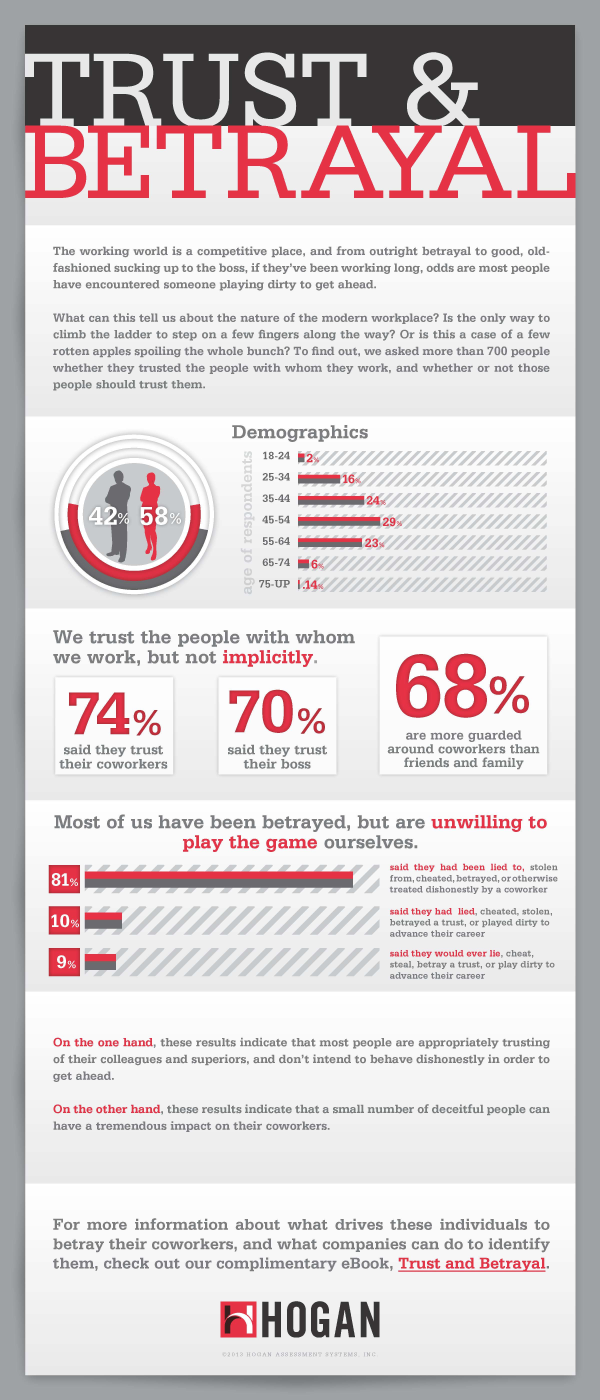Topics: leadership, judgment, integrity, trust
 An individual’s ability to exercise leadership is hinged on his or her ability to persuade others to follow. According to the Hogan Leadership Model, followers look for four essential qualities in a leader: integrity, judgment, competence, and vision. Of these, integrity is most essential.
An individual’s ability to exercise leadership is hinged on his or her ability to persuade others to follow. According to the Hogan Leadership Model, followers look for four essential qualities in a leader: integrity, judgment, competence, and vision. Of these, integrity is most essential.
In a recent survey, Hogan asked more than 1,000 individuals about the qualities of their all-time best boss. Eighty-one percent of respondents said trustworthiness was their most important personality characteristic. Conversely, 50% described their worst boss as deceitful.
“People need to know that the person in charge won’t take advantage of his or her position,” said Dr. Robert Hogan, founder of Hogan Assessments. “That they won’t lie, steal, play favorites, and betray subordinates.”
In a separate study, Dr. Hogan and Hogan co-founder and former vice president Dr. Joyce Hogan gathered personality data and performance ratings from the immediate supervisor and subordinates of 55 managers at a large transportation company. Statistical analysis revealed that subordinates ratings of their managers’ overall effectiveness was directly tied to the degree to which a manager was trusted.
Unfortunately, as the as the past decade of scandal, corruption, and Congressional hearings proved, there are an alarming number of dishonest people in leadership roles. Our latest complimentary eBook, Trust and Betrayal, examines who these people are, and how companies can prevent them from damaging their workforce.
Topics: leadership, judgment, integrity, trust
 In their book chapter “The Mask of Integrity,” published in Citizen Espionage: Studies in Trust and Betrayal, Drs. Joyce and Robert Hogan, outlined four characteristics that typified the ideal betrayer:
In their book chapter “The Mask of Integrity,” published in Citizen Espionage: Studies in Trust and Betrayal, Drs. Joyce and Robert Hogan, outlined four characteristics that typified the ideal betrayer:
Charisma – According to Dr. Tomas Chamorro-Premuzic, vice president of research and innovation at Hogan, there are three ways to influence others: force, reason, or charm. Force and reason are rational – even when people are forced to do something, they obey for a good reason. Charm, on the other hand, is based on emotional manipulation and has the ability to trump rational assessments.
Self-absorption – The second characteristic of an ideal betrayer is an unusual degree of self-absorption, or, more to the point, a relentless drive for self-advancement. Betrayers possess a ruthless dedication to self-advancement to the extent that other people lose their value as humans and become objects to be manipulated.
Self-Deception – The third characteristic that typifies the ideal betrayer is self-deception. A major tenet of psychoanalysis and existentialism is that people are prone to deceive themselves about the reasons for their actions.
Hollow Core Syndrome – The final characteristic of the ideal betrayer is a pattern of personality characteristics called the hollow core syndrome. The hollow core syndrome refers to people who are overtly self-confident, who meet the public well, who are charming and socially poised, and who expect others to like them, but who are privately self-doubting and unhappy.
Unfortunately, this charm, confidence, and talent for ingratiation provides betrayers the tools they need to find employment at and quickly ascend the ranks of large, hierarchical organizations, and the private self-doubt associated with the hollow core fuels their pursuit of the money, power, and prestige offered by senior management positions. Trust and Betrayal, a new eBook from Hogan, examines what companies can do to identify and mitigate the effects of betrayers in their ranks.
Topics: leadership, judgment, integrity, trust



